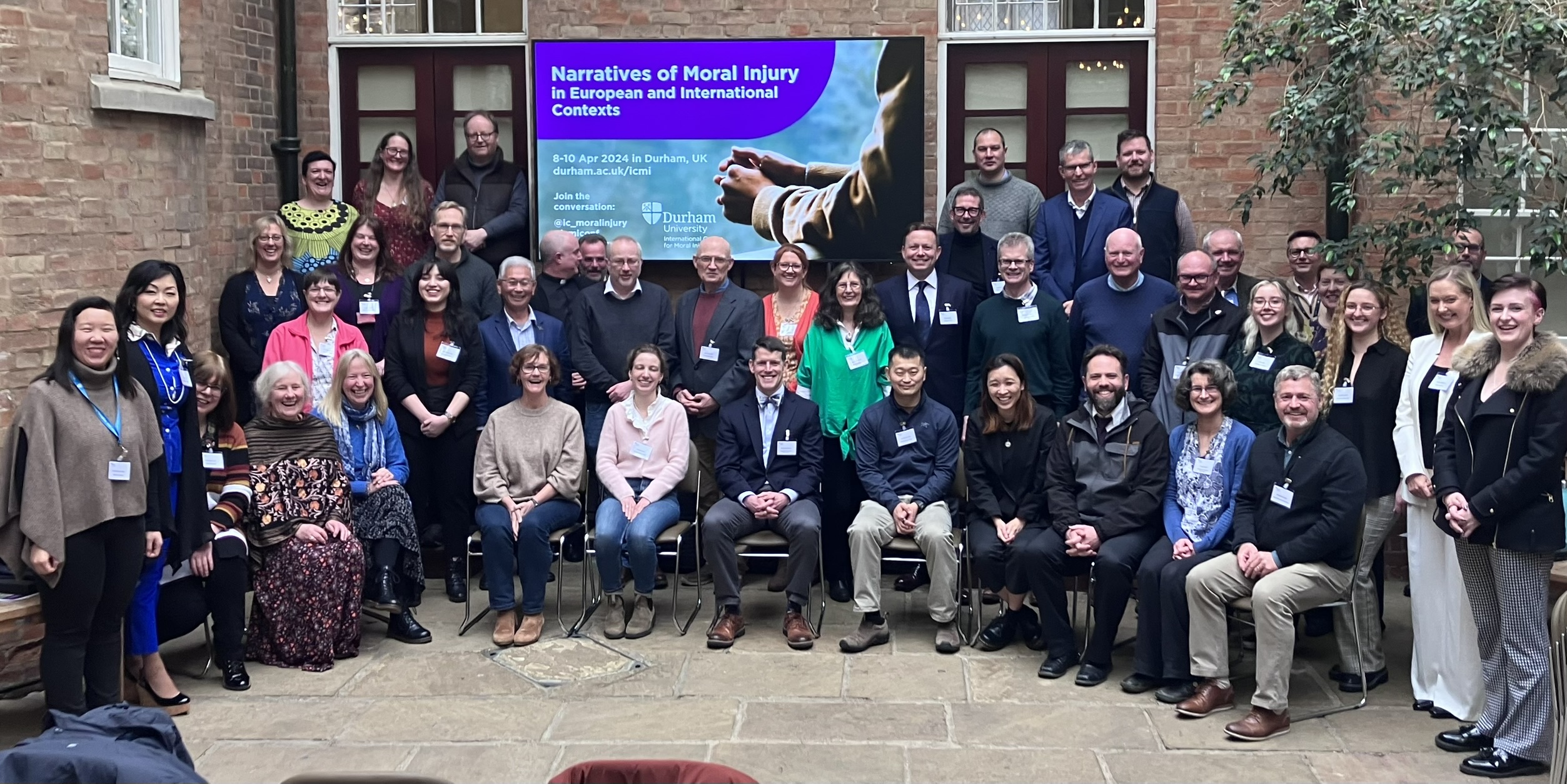Conferences
Our most recent conference was held in early April 2024, when we were delighted to be joined by 50 academics, clinicians, chaplains and others to discuss moral injury in European and international contexts.

Some resources from the conference will be made available – watch this space! If you would like to receive resources from this conference and news of next year’s event, you might like to consider registering for the ICMI mailing list.
April 2024 Conference Programme
Introductory session
Welcome by Brian Powers (International Centre for Moral Injury, Durham University)
Wendy Cooper (International Centre for Moral Injury, Durham University):
Moral injury in context and the importance of understanding the contextual response
Session 1: Investigating moral injury and questioning assumptions
Colette Hawkins (South Tees NHS Foundation Trust):
Defying death: Do we risk moral injury by medicalising the end of life?
Cher McGillivray (Bond University, Australia):
A multidimensional scaling investigation of the clinical utility of the Intrapersonal Moral Injury Scale (IMIS)
Session 2: Moral injury and the church
Aaron Fuller (Shay Moral Injury Center, Volunteers of America):
It's not burnout: Moral injury as a lens to reframe and address church decline in Europe and North America
Rhona Knight (Durham University, UK):
Great expectations, moral injury and the church
Maggi Creese (Diocese of Newcastle, UK), Sarah Troughton (NHS psychiatrist with lived experience of church-related abuse), David Creese (Newcastle University, survivor of church-related abuse) and Peter Locke (organist and composer, survivor of church-related abuse):
Moral injury and church-related abuse: A new framework for ritual created by survivors
Evening session: Film screening
The UK premiere of What I Want You to Know, an intimate documentary film about the Iraq and Afghanistan wars. With searing candour, veterans share personal stories from their deployments in Iraq and Afghanistan, and explore the moral tragedy of their wars.
Followed by a discussion with the film’s director Catie Foertsch and film participant and veteran Garett Reppenhagen
Session 3: Moral injury narratives and the role of chaplains in the Australian context: A bio-psycho-social-spiritual approach to prevention and treatment
Mark Layson (Charles Sturt University) and Lindsay Carey (La Trobe University)
Session 4: Moral injury, health and social care
Andrea Lambell (Durham University, UK):
Distancing, PPE, and moral distress in England’s hidden health and care landscape, 2020-22
Amelia Pearson, Catherine Robinson, Rebecca McPhillips, Paul Clarkson, Janine Owens (all University of Manchester, UK) and Eleanor Hinchliffe (South West Yorkshire Partnership NHS Foundation Trust, UK):
Agent of the state vs advocate for people: An exploration of English social workers’ experiences of moral injury
Elanor Webb (St Andrew's Healthcare and University of Central Lancashire, UK), Jane Ireland and Michael Lewis (University of Central Lancashire):
Pathways from moral injury: Exploring associated wellbeing outcomes and the mediating role of emotional schema
Session 5: Australasian contexts and categories for moral injury
Atsushi Shibaoka (University of Divinity, Australia):
Moral injury as a war syndrome: An historical approach
Matthew Hawkins (University of Otago, New Zealand):
Third match official decision pending: The evidence of moral injury in elite sport?
Session 6: Conceptualising moral injury in Asian and African contexts
Kristine Chong (Shay Moral Injury Center, Volunteers of America) and Jeeyoung Kim (University of Denver and Iliff School of Theology):
Postmemory and countermemory retrievals of morally injurious histories by the Korean diaspora
Xiaoge Wang (Durham University, UK):
The unspeakable truth: Japanese shame culture in An Artist of the Floating World
Assala Khettache (Aberystwyth University, UK):
Exploring the consequences of neglect: The weaponization of collective moral injuries in African societies
Evening session: Photography exhibition: Afghanistan veterans: Moral injury and righting wrongs
Introduced by project co-leads Sara de Jong (University of York, UK) and Andy Barnham (photographer and British Army veteran) and veteran and participant Marcus Grotian (Patenschaftsnetzwerk Afghanische Ortskräfte, or Sponsorship Network for Afghan Local Staff, Germany)
You can see the photographs and read excerpts from the interviews with veterans in the Exhibition Guide (opens pdf).
Session 7: Examining and responding to moral injury
Lily An-Kim (McMaster Divinity College, Canada):
Moral watermarks at the margins: Entering endangered waters after injuries to matriarchs
Dayne Nix (US Naval War College):
The lasting impact of moral injury on war veterans: G. A. Studdert Kennedy's struggle against the glorification of war by observances of Armistice Day and Britain's war memorials, 1921-1929
Stephen Radley (University of Roehampton, UK):
Creating new theologies of war from the embodied experience of moral injury through photographic practices of visio divina
Session 8: Workshop drawing on Reflect and Renew, a retreat-based intervention for moral injury in frontline workers
Simon Edwards, Alison O'Connor and Sophie Redlin (Moral Injury Partnership, UK)
Closing session
Reflections by Zachary Moon (Chicago Theological Seminary, USA)


/prod01/prodbucket01/media/durham-university/research-/research-centres/international-centre-for-moral-injury/Moral-injury-banner-2-1920X290.jpg)